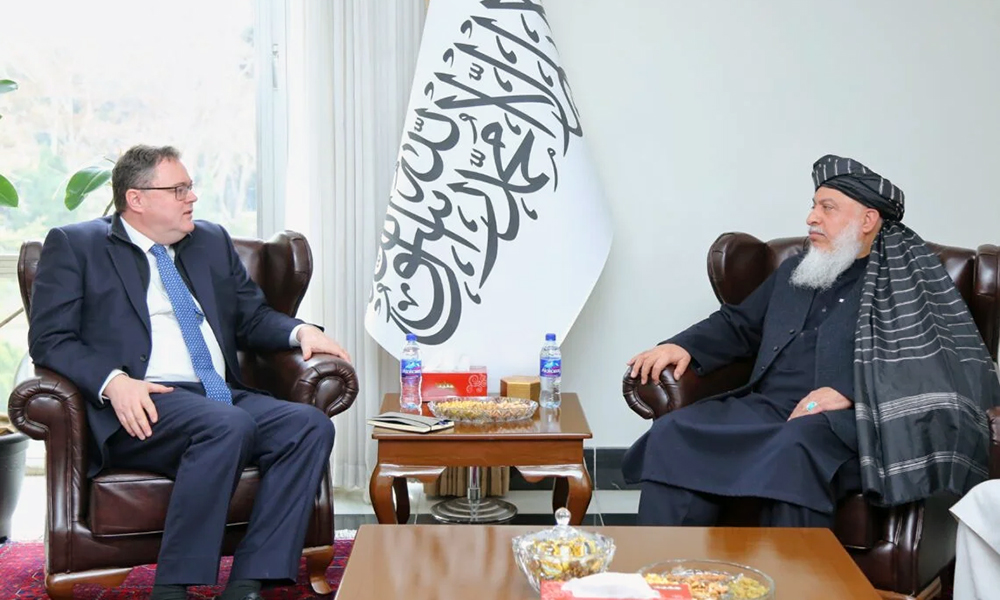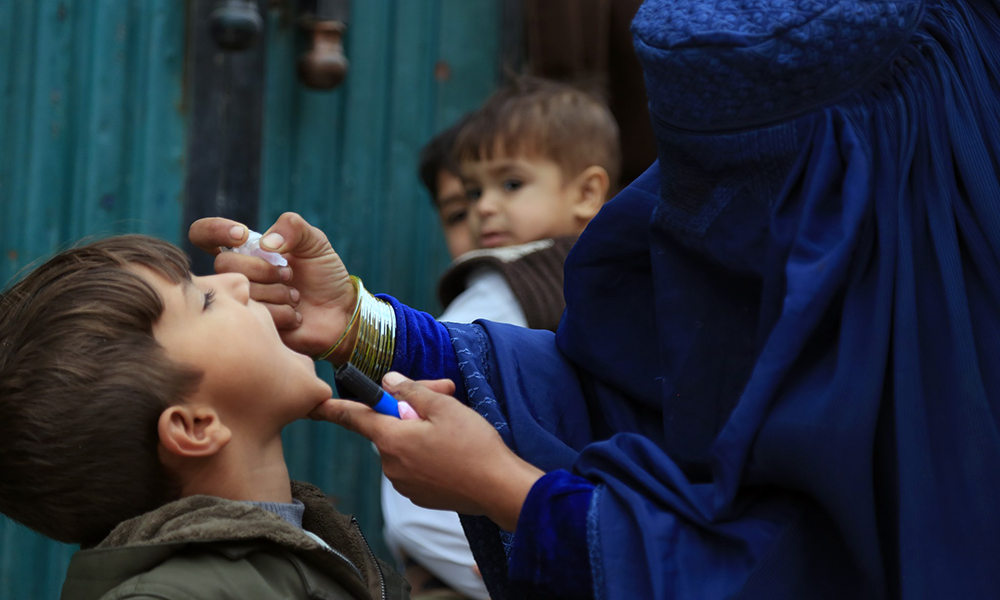Latest News
Pakistan struggles to quell violence on its Afghan border

Pakistan's military has stepped up operations along the Afghan border in recent weeks after a spate of militant attacks that has dashed any hope the frontier might see more peace and stability after the end of the war in Afghanistan, Reuters reported.
Islamist and separatist factions have killed at least 14 Pakistani soldiers in attacks over the past month, three of them carried out by fighters entering from Afghanistan, the Pakistani military said.
Afghanistan's new rulers, struggling with a humanitarian crisis, have denied that Afghan territory was used in any of the attacks, Reuters reported.
But despite such assurances, disputes linked to the border, which has been a bone of contention between the neighbours for decades, could undermine their relations.
The Pakistani military said six insurgents were killed in the latest clash in the resource-rich southwestern province of Balochistan on Wednesday.
"Operations to eliminate such perpetrators of terrorist acts in Pakistan will continue," the military said in a statement.
A top Pakistani security official with direct knowledge of border operations told Reuters: "We have stepped up intelligence-based operations to ensure that we deny entry to militants."
Large areas on the Pakistani side of the border were out of the control of the government for decades, ruled by fiercely independent Pashtun tribes, whose communities often straddle both sides of the unmarked border, Reuters reported.
But Pakistan is determined to end all that, aiming to bring the rugged Pashtun lands under central rule and to demarcate the border with a fence, and control who comes and goes with a tight border-control system, another Pakistani official said.
"We're targeting anyone, whether separatists or Islamists militants, who is a threat," said the second official, who also declined to be identified.
Pakistan has enjoyed good relations with the Islamic Emirate of Afghanistan (IEA) for years even though Pakistan was officially an ally of the United States during its 20-year occupation of Afghanistan, Reuters reported.
But as Pakistan grapples with violence by Pakistani Islamists and separatists, its appeals to the IEA to control their side of the border have not brought the action it hopes to see.
Increasingly frustrated, Pakistani officials have been pressing the IEA to deny space and resources to the militants, an appeal repeated by National Security Adviser Moeed Yusuf when he visited Kabul last month, Reuters reported.
Yusuf's office did not respond to a request for comment.
In Kabul, the IEA reject suggestions Afghan territory is used for attacks into Pakistan and hope talks can solve the problem.
"We're trying to solve such actions through diplomatic ways," defence ministry spokesman Enayatullah Khowarazmi told Reuters.
The IEA tried late last year to facilitate talks between Pakistan and an alliance of al-Qaeda linked militants known as the Tehrik-e-Taliban Pakistan (TTP), or Pakistani Taliban. But the talks fell apart after a few weeks, read the report.
Despite the frustrations, Pakistani officials rule out the chance of any serious deterioration in relations with the IEA.
"We're budding friends," one of the officials said.
The Pakistani military's information office did not respond to a request for comment about the scope of its operations and what the military would do if the attacks from Afghan soil continued.
Another source of friction is Pakistan's determination to finish fencing the 2,600 km border that was drawn by British colonial rulers with no consideration for the Pashtun tribes it divided. It has never been recognised by any Afghan government.
According to Reuters Islamic Emirate (IE) forces have at times stopped Pakistani forces from putting up the fence, just as forces of the old U.S.-backed Afghan government used to do.
IEA acting Defence Minister Mullah Yaqoob says his government had not given anyone permission to fence the border.
"We've not taken any decision about the fencing," he told Afghan state-owned RTA TV last week.
Latest News
Norwegian Chargé d’Affaires meets with IEA deputy foreign minister
Welcoming the diplomat’s visit to Kabul, Stanikzai underscored the importance of political relations between Afghanistan and Norway, the foreign ministry said in a statement.

The Norwegian Chargé d’Affaires for Afghanistan, Per Albert Ilsaas, on Saturday met with IEA’s Deputy Foreign Minister for Political Affairs, Sher Muhammad Abbas Stanikzai, in Kabul.
Welcoming the diplomat’s visit to Kabul, Stanikzai underscored the importance of political relations between Afghanistan and Norway, the foreign ministry said in a statement.
In addition to focusing on bilateral political, humanitarian, and other pertinent issues, the two sides expressed hope that continued engagement would lead to constructive solutions to related issues.
This comes two weeks after the Foreign Ministry Spokesman Abdul Qahar Balkhi expressed disappointment regarding the decision by the Norwegian government to downgrade diplomatic relations with Afghanistan.
Balkhi said in a post on X that such decisions should not be linked with internal affairs of other countries.
“Diplomatic engagement is most effective when it fosters mutual understanding and respect, even amidst differing viewpoints,” he stated.
“Access to consular services is a fundamental right of all nationals. We strongly urge all parties to prioritize this principle in the spirit of international cooperation,” he added.
Latest News
A new polio vaccination campaign is set to launch in Afghanistan
Afghanistan and Pakistan are the only two countries in the world where polio has not been eradicated.

The “Afghanistan Polio-Free” organization announced that a new round of polio vaccinations will begin on Monday, December 23, in various provinces of Afghanistan.
The organization did not specify which provinces will be targeted or how long the vaccination campaign will last.
Afghanistan and Pakistan are the only two countries in the world where polio has not been eradicated.
On December 4, 2023, the World Health Organization (WHO) issued a statement reporting a 283% increase in polio cases in Afghanistan. According to the WHO, the number of positive environmental samples for wild poliovirus type 1 in Afghanistan in 2024 reached 84, compared to 62 cases in 2023.
The Ministry of Public Health claimed in November 2024 that no new cases of polio had been reported in Afghanistan for the year.
Latest News
G7 envoys urge national dialogue for lasting stability in Afghanistan

Special Representatives of the Group of Seven (G7), including the European Union, have emphasized the importance of a national dialogue for achieving long-term stability in Afghanistan.
Following a meeting on Afghanistan in Geneva, Switzerland, G7 special envoys issued a joint statement calling for the restoration of women's rights and urging the Islamic Emirate to fight terrorism.
The statement reads: "Achieving sustainable peace and stability requires credible governance that represents all segments of Afghan society."
The representatives also expressed concern over the IEA’s decision to ban girls from attending medical institutes, warning that it will have devastating consequences for the citizens, particularly mothers and their infants.
The statement described this ban as unacceptable and called on the Afghan authorities to lift it immediately.
Earlier, countries and international organizations had called for the removal of restrictions on the education and employment of women and girls, emphasizing the need for a national dialogue.
In response to these concerns, IEA has repeatedly stated that it will not allow interference in the internal affairs of the country.
The G7 special envoys also expressed their concern about the recent terrorist attacks in Kabul and the surrounding region, warning that terrorism remains a serious threat to Afghanistan's security. They confirmed the actions of the IEA against Daesh but stressed the need for more decisive measures.
-

 Sport5 days ago
Sport5 days agoLanka T10: All three matches abandoned due to rain
-

 Latest News5 days ago
Latest News5 days agoIndia hoping to import coal and marble from Afghanistan
-

 Sport4 days ago
Sport4 days agoZimbabwe’s opening ODI against Afghanistan abandoned
-

 Latest News5 days ago
Latest News5 days agoJapan announces $27.5 million aid package to Afghanistan
-

 World3 days ago
World3 days agoNorth Korean troops suffer 100 deaths, struggling in drone warfare, South Korea says
-

 Latest News3 days ago
Latest News3 days agoTwo horror accidents on Kabul-Kandahar highway leave 52 dead
-

 Latest News1 day ago
Latest News1 day agoAfghan men must stand with women to support viable future of country: US envoy
-

 International Sports4 days ago
International Sports4 days agoLanka T10: Kandy Bolts in at 4th spot in playoffs after thrilling day
























